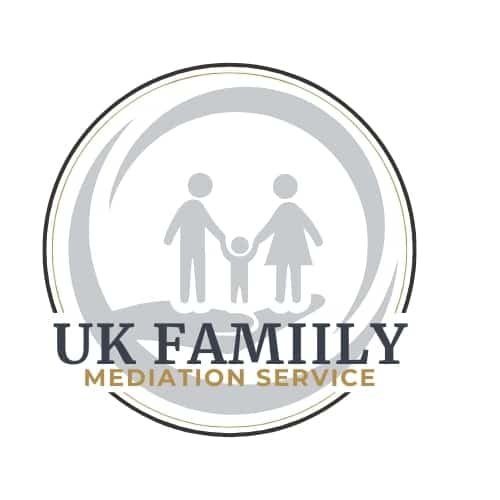An introduction to mediation – If you’re going through a separation or divorce, family mediation can be a helpful way to resolve issues without going to family court. Mediation helps couples discuss child arrangements, finances, and property in a structured and supportive environment. If you are struggling to find solutions around where the children will live, who they are going to spend time with or even disputes over education or medical issues, mediation can help.
UK Family Mediation answers the most common questions people search for about mediation and alternative dispute resolution in the UK.

What is Mediation After Separation in the UK? Introduction To Mediation
Mediation after separation is a process where a trained, independent professional mediator helps both parties work out arrangements following the end of a relationship. This can include:
- Childcare and parenting arrangements
- Dividing finances and property
- Practical day-to-day decisions
The mediator helps with discussions but does not make decisions for you. Mediation can reduce stress, save money, and help maintain a positive relationship while avoiding the need for court. Mediation is a collaborative process around disagreements in divorce or separation. It works to help you find ways to come to agreements with the guidance of a neutral mediator. Their role is to understand the disputes that are stopping you from coming to agreements in a way that feels right for everyone and is in the best interest of the children
How Does Mediation Start? The MIAM Explained
Mediation usually begins with a Mediation Information and Assessment Meeting (MIAM). Each person meets with the mediator individually first. This is not a group session.
During the MIAM, the mediator will:
- Explain how mediation works
- Outline the principles of mediation
- Provide information about alternative options if mediation isn’t suitable
This helps you decide whether mediation is the right approach for your situation. Going into a MIAM does not mean that you will be guaranteed to go into the mediation process. It is a stepping stone toward mediation but can also be the step you need if you want to take your situation to family court.
What Happens After the MIAM?
If mediation is suitable, a joint session is then scheduled. Most mediation happens online nowadays. This means that there is no need to see your ex in the same room or find time to travel to attend. By removing these time and convenience barriers it allows more people to attend mediation to find solutions. If things are particularly difficult it might be that shuttle mediation is an option for you. Shuttle mediation is where the sessions are held in separate calls instead of a three way call. The mediator goes between you to help you talk and find solutions.
How Many Mediation Sessions Will I Need?
Mediation is a process, and more than one session is usually needed:
- Sessions typically last 90–120 minutes
- Most couples need between 2–6 sessions, depending on the complexity of issues like children, finances, or property.
There is no fixed solution to your mediation process. Everyone has a different background and issues. Mediation is designed to help you work through your problems at your pace. It ultimately depends on everyone’s willingness to participate and the conversation to be discussed. It is impossible to put a time limit on the time it will take for you to find solutions but the goal is to help you work through your issues at a speed that is comfortable for everyone.
Do I Have to Be in the Same Room as My Ex To Mediate?
Not necessarily. As mentioned, shuttle mediation is often a solution the people choose where there is high conflict and a breakdown in communication between couples. At your MIAM (mediation information assessment meeting) the mediator will learn how to help tailor your experience for you to get the best from the process. They will suggest options to help you consider mediation.

Should I disclose my finances in mediation?
If finances are being discussed, full financial disclosure is required. This ensures both parties:
- Understand each other’s financial situation
- Make informed decisions
- Can raise and discuss any questions within mediation
What Happens if We Reach an Agreement in Mediation?
Agreements in mediation are not legally binding until you have received legal advice.
The mediator can prepare:
- Memorandum of Understanding (MoU) – summarises agreements reached
- Summary of Financial Information – details your financial circumstances (if finances are involved)
A solicitor can then use these documents to create a legally binding agreement, which can also be submitted to the court if needed. Mediation helps you put the plans together and mediation makes it legal. The benefit of mediation is that it gives you the opportunity to create your arrangements in full collaboration with your ex. You get to have your say, your voice and how you want to find ways to work together. Mediation is a de-escalation of your dispute and does not mean that court is the next step however. If you are able to find solutions between yourselves you do not need court to make decisions for you.
Benefits of Mediation vs Court Proceedings
Mediation can:
- Save money compared to court fees
- Reduce stress and emotional strain
- Allow couples to maintain a positive relationship
- Offer a faster, more flexible solution
Mediation gives you the chance to build arrangements that work for you with the best interests of your children. A court order will tell you what you have to do and you must stick to it by law. You may not get a say in the final outcome if a judge decides what the plans will be moving forward.
FAQs About Mediation for Separated Couples
Q: Can mediation focus only on child arrangements?
Yes. Mediation can deal solely with parenting issues if finances are not part of the dispute.
Q: Is mediation confidential?
Yes. Discussions in mediation is usually confidential and usually cannot be used in court usually. Unless there is a risk of safe guarding or safety which then may reported.
Q: Can mediation work if my ex is high-conflict?
Yes. Options like shuttle mediation or online sessions make mediation safer and more effective.
Q: How long does mediation take?
Sessions usually last 60–120 minutes. Most couples need several depending on the issues.
Q: Are agreements made in mediation legally binding?
Mediation helps you put the agreements together but is not legally binding in its first instance. A mediator can provide an Memorandum of Understating and financial summary at the end of mediation, which a solicitor can convert into a binding agreement if needed. You can also decide to take any plans made in mediation to family court to have made legal. This way, your decisions will become part of any legal court order.
Q: How much does mediation cost in the UK?
Costs vary, but mediation is usually cheaper than going to court. Funding options are available to support the cost of mediation. Legal Aid is an option if you are on a low income or in receipt of Universal Credit. The Family Mediation Voucher Scheme is currently available until March 2026 and is a non means tested scheme which means it is available to those to want to access it regardless of income.
Legal Aid can cover both the costs of the initial MIAM assessment in England and Wages. The Family Mediation Voucher Scheme can cover up to £500 of joint mediation costs when the conversation is around children. It is a one time offer and our team can let you know more and apply for it on your behalf. Find out more about the Family Mediation Voucher here.
Mediation can be a cost-effective, low-stress, and collaborative way to resolve issues after separation. By focusing on communication and joint decision-making, it helps preserve positive relationships while avoiding court to make decisions for you.
When thinking about starting mediation, we understand that it can feel confusing and scary. However mediation is able to offer a low dispute solution to family disputes without using court as a first step. Speak to UK Family Mediation today on 0330 01011571 to find out more about the family mediation process and funding options available in the UK and Wales.
